 W
WAlliance 90 was a political alliance of three non-communist political groups in East Germany. It was formed in February 1990 by the New Forum, Democracy Now and the Initiative for Peace and Human Rights. It received 2.9% of the vote in the 1990 Volkskammer elections. For the first all-German federal election it formed a joint list with the East German Green Party. It was this coalition that merged with the West German Green Party in 1993 to form Alliance 90/The Greens.
 W
WThe Alliance for Germany was an opposition coalition in East Germany. It was formed on 5 February 1990 in Berlin to stand in the East-German Volkskammer elections.
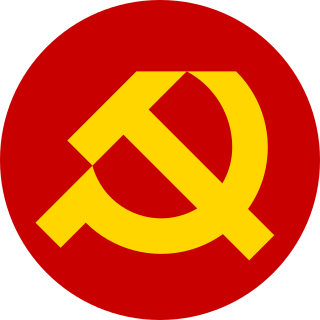 W
WThe Bulgarian Communist Party was the Communist and Marxist-Leninist ruling party of the People's Republic of Bulgaria from 1946 until 1989 when the country ceased to be a socialist state. The Bulgarian Communist Party had dominated the Fatherland Front coalition that took power in 1944, late in World War II, after it led a coup against Bulgaria's tsarist regime in conjunction with the Red Army's crossing the border. It controlled its armed forces, the Bulgarian People's Army.
 W
WThe Christian Democratic Union of Germany was an East German political party founded in 1945. It was part of the National Front with the Socialist Unity Party of Germany (SED) and a bloc party until 1989.
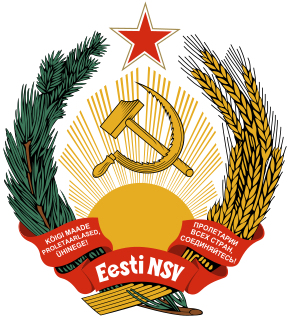 W
WThe Communist Party of Estonia was a political party in Estonia.
 W
WThe Communist Party of Latvia was a political party in Latvia.
 W
WThe Communist Party of Lithuania is a communist party in Lithuania. The party was established in early October 1918 and operated clandestinely until it was legalized by Soviet authorities in 1940. The party was banned in August 1991, following the collapse of the Soviet Union and the dissolution of the Lithuanian SSR.
 W
WDemocratic Beginning was an East German political movement and political party that was active during the Revolutions of 1989 and in the period leading up to the German reunification. While it was a relatively minor party, it took part in the first democratically elected government in East Germany in 1990, and is especially known because future Chancellor of Germany, Angela Merkel started her political career within the party.
 W
WDemocratic Labour Party of Lithuania was the renamed Communist Party of Lithuania. It was a political party in Lithuania in the 1990s, which claimed to be social-democratic. The youth organization of LDDP was called Lithuanian Labourist Youth Union.
 W
WThe German Forum Party was an opposition political party in East Germany. It was formed from the New Forum citizens' movement. It was founded in Karl-Marx-Stadt on 27 January 1990. Its first chairman was Jürgen Schmieder. It described itself as being at the political centre.
 W
WThe Hong Kong Alliance in Support of Patriotic Democratic Movements of China is a pro-democracy organisation that was established on 21 May 1989 in the then British colony of Hong Kong during the demonstration for the students protest in Tiananmen Square in Beijing. After the 4 June massacre, the organisation main goals are the rehabilitation of the democracy movement and the accountability for the massacre. The main activities the organisation holds are the annual memorials and commemorations, of which the candlelight vigil in Victoria Park is the most attended, reported and discussed event each year. Due to its stance, the Central government in Beijing considers the organisation subversive.
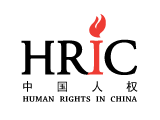 W
WHuman Rights in China is a New York-based international, Chinese, non-governmental organization with intentions to promote international human rights and facilitate the institutional protection of these rights in the People's Republic of China. HRIC is a member organization of the International Federation for Human Rights. According to Fang Lizhi, HRIC is committed to an independent, non-political, and intelligent approach
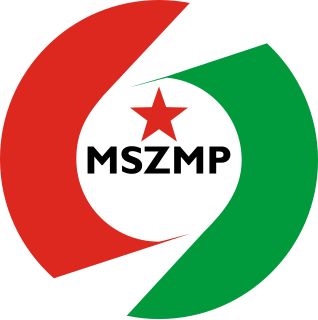 W
WThe Hungarian Socialist Workers' Party was the ruling Marxist–Leninist party of the Hungarian People's Republic between 1956 and 1989. It was organised from elements of the Hungarian Working People's Party during the Hungarian Revolution of 1956, with János Kádár as general secretary. The party also controlled its armed forces, the Hungarian People's Army.
 W
WThe Initiative for Peace and Human Rights was the oldest opposition group in East Germany. It was founded on 24 January 1986 and was independent of the churches and state. On 7 February 1990 it joined with New Forum and Democracy Now to form the electoral Alliance 90 and merged with them to form the Alliance 90 party on 21 September 1991.
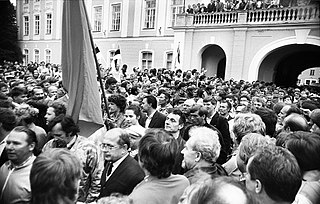 W
WThe Intermovement (International Movement of Workers in the Estonian Soviet Socialist Republic) was a political movement and organisation in the Estonian SSR. It was founded on 19 July 1988 and claimed by different sources 16,000 - 100,000 members. The original name of the movement was Interfront, which was changed to Intermovement in autumn 1988.
 W
WThe National Salvation Front is the name of a political organization that was the governing body of Romania in the first weeks after the Romanian Revolution in 1989. It subsequently became a political party, and won the 1990 election under the leadership of then-President Ion Iliescu.
 W
WNew Forum was a political movement in East Germany formed in the months leading up to the collapse of the East German state. It was founded on 9 September 1989 and was the first independent political movement to be recognised by the Socialist Unity Party of Germany-led state on 8 November 1989. In February 1990 it formed Alliance 90 with Democracy Now (DJ) and the Initiative for Peace and Human Rights (IFM).
 W
WThe Party of Democratic Socialism was a democratic socialist political party in Germany active between 1989 and 2007. It was the legal successor to the Socialist Unity Party of Germany (SED), which ruled the German Democratic Republic as a state party until 1990. From 1990 through to 2005, the PDS had been seen as the left-wing "party of the East". While it achieved minimal support in western Germany, it regularly won 15% to 25% of the vote in the eastern new states of Germany, entering coalition governments in the federal states of Mecklenburg-Vorpommern and Berlin.
 W
WThe Romanian Communist Party was a communist party in Romania. Successor to the pro-Bolshevik wing of the Socialist Party of Romania, it gave ideological endorsement to a communist revolution that would replace the social system of the Kingdom of Romania. After being outlawed in 1924, the PCR remained a minor and illegal grouping for much of the interwar period, and submitted to direct Comintern control. During the 1920s and 1930s, most of its activists were imprisoned or took refuge in the Soviet Union, which led to the creation of competing factions which at times came in open conflict. This did not prevent the party from participating in the political life of the country through various front organizations, most notably the Peasant Workers' Bloc. The Communist Party emerged as a powerful actor on the Romanian political scene in August 1944, when it became involved in the royal coup that toppled the pro-Nazi government of Ion Antonescu. With support from Soviet occupational forces, the PCR was able to pressure King Michael I into abdicating, and establish the Romanian People's Republic in December 1947.
 W
WThe Social Democratic Party in the GDR was a reconstituted Social Democratic Party existing during the last phase of the East German state. Slightly less than a year after its creation it merged with its West German counterpart to form the Social Democratic Party of Germany.
 W
WThe Union of Democratic Forces is a political party in Bulgaria, founded in 1989 as a union of several political organizations in opposition to the communist government. The Union was transformed into a single unified party with the same name. The SDS is a member of the European People's Party (EPP). In the 1990s the party had the largest membership in the country, with one million members, but has since splintered into a number of small parties totaling no more than 40,000 members. The SDS proper had 12,000 members in 2016.